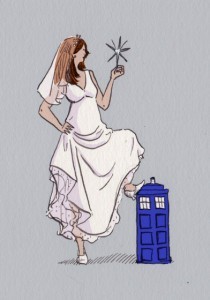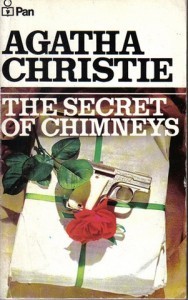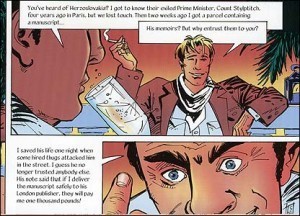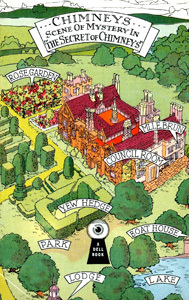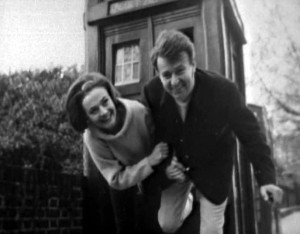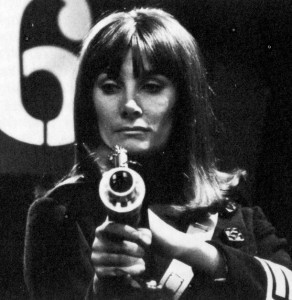Tansy Rayner Roberts's Blog, page 120
February 11, 2012
Watching New Who: The Runaway Bride
Original fan art by Kathleen Jennings.
"The Runaway Bride"
Season Two Christmas Special
The Doctor – David Tennant
Donna Noble – Catherine Tate
Check out Kathleen's awesome artwork at her blog, particularly her regular Dalek Game pieces! And you might like to know that Kathleen is eligible for Best Fan Artist, if you're nominating for the Hugos…
TANSY:
This Christmas Special was probably one of the most divisive Doctor Who stories in its time, because it all came down to whether you loved or hated Donna (Catherine Tate). I liked Donna at the time, but came to love her more and more in retrospect, and so I find that I like this story more every time I watch it. Having said that, I'm not in it for the plot!
TEHANI:
I love Donna! She was a bit bumpy in this, her first appearance, but she is so awesome!!
DAVID:
I liked Donna as a character, but in terms of the writing there were a lot of lazy stereotypes about women and about brides in this, and a bit too much fun at her expense, rather than fun with her. She was a great contrast to Rose, though.
TANSY:
I agree about the lazy stereotypes – and by the end of the RTD era I was so over WEDDINGS, I can tell you! But ultimately I think Catherine Tate rescued the character from sliding too far into generic chick lit cliche.
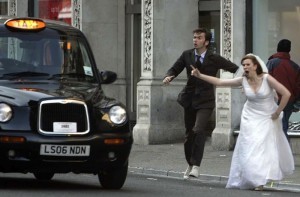 After the sweetness of Ten/Rose in Season 2, it feels like such a relief to have a companion yelling at the Doctor and smacking him around! The whole panic-chase sequence in the first act of the story with the two of them bouncing off each other, arguing and hailing taxis was great fun…
After the sweetness of Ten/Rose in Season 2, it feels like such a relief to have a companion yelling at the Doctor and smacking him around! The whole panic-chase sequence in the first act of the story with the two of them bouncing off each other, arguing and hailing taxis was great fun…
TEHANI:
The car/TARDIS chase was loads of fun, but the melancholy of bringing Rose into it was a nice touch. While Rose wasn't and won't ever be my favourite companion, it's good to see she's not just immediately dropped from memory.
And the little flashback scene at the reception to me highlighted the fact that the Doctor actually does have some sort of real feelings for Rose. Which is interesting.
TANSY:
Part of me winces at the many references to Rose in this episode, but on the other hand I remember watching so many TV shows from the last century when there was a frustrating lack of acknowledgement of characters who had just left, so I haven't made up my mind about this one. It's important to Donna's story that she knows who Rose is and what he means to the Doctor but oh, did he have to be quite so mournful? Am I a bitch for wishing he would put his big girl panties on and get over it?
I can't understand anyone who reads their relationship as being platonic after seeing "The Runaway Bride"!
DAVID:
Oh, I didn't get any more from it than someone mourning for a lost, platonic friend. 
TEHANI:
*cough* Liar *cough* 
DAVID:
But yes, I think it would be very cold if the Doctor had just moved on and never mentioned Rose again after all she meant to him, especially considering the episode starts literally as he is saying goodbye to her!
Whether we run into Donna again or not (and I have tried avoid spoilers as best I can), I am glad that she didn't come along with the Doctor at the end of the episode, talk about on the the rebound!
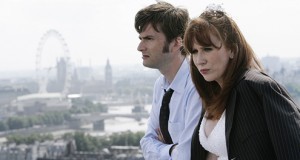 TANSY:
TANSY:
Yes, Donna isn't the first companion to say no to the Doctor (that was Mickey take one!) but it gives her strength that she makes that decision. After an episode that sets her up as not being all that smart, she's certainly more aware than Rose was about what travelling with the Doctor might mean.
On the rooftop especially, Donna starts to feel more human (instead of frantic and shouty, though I love her shouty) and we get some genuine emotion going on, quiet moments to balance out the crazy. Yes, I'm definitely in the pro-Donna camp.
TEHANI:
The rooftop really showed that Donna has more depth than shouting and smacking about – a good sign!
The music in this was so ANNOYING the second time around. I didn't notice it first time, but on the rewatch it irritated me so much! Overloud, overly trumpetish or something, and really not at all suiting the story.
The monster was … hmmm. Over the top? And interesting in that we don't MEET her until almost halfway through! Although to me, Lance is also a monster – horrible man, saying horrible things and breaking poor Donna's heart.
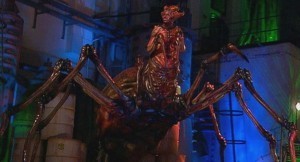 DAVID:
DAVID:
The Empress was a good concept, but the performance was way too over the top for me, and the jokes? Egads. That "I do" bit makes all my lame jokes look like masterpieces of comedic improv. The idea of hiding something at the centre of a planet being formed was genius though.
TANSY:
Sarah Parrish is a really good and well-regarded British actress – but sadly she now joins the ranks of the Great British Actors who over egged the pudding when faced with a Doctor Who role … possibly there should be some kind of Graham Crowden Award for this phenomenon?
DAVID:
It may sound overly harsh but when Donna says Lance didn't deserve his fate, I found it hard to agree. What a terribly cruel thing to do to someone, and what terribly cruel things to say to someone!
TANSY:
Ha well, I think it's a bit much to say he deserved to die, but I certainly take some satisfaction in the moment, fictionally speaking – he is horrid to her, and I think it's a measure of how much we're on her side that we already know (as does the Doctor) that there's more to Donna than the ordinary-person-brainless-chatter that Lance complains about.
DAVID:
There were some really nice moments with the TARDIS in this episode. Seeing the TARDIS materialise around them was a wonderful visual effect, and the car chase was great fun! And, of course, the usual "it's bigger on the inside" stuff. It did remind me how much I miss the old white interior, though. I do like the steampunk sensibility but I did suffer a brief wave of nostalgia for some reason.
TANSY:
I love the TARDIS chase down the highway, it's a fantastic scene – I can't believe people complained about it! It's utterly joyous and I enjoy the lines when he's trying to get her to jump out of the cab and she says she's in her wedding dress. [DOCTOR: Yes, you look lovely, now jump!] Also, David, you might have spotted this one – I really like the moment when she realises she is being driven by a robot Santa, which feels like a callback to the '70s Auton stories.
TEHANI:
You're talking again about stuff I don't know! What's an Auton??
TANSY: You saw them back in Rose – walking plastic shop dummies. They appeared twice in the early Seventies and then disappeared for 35 years!
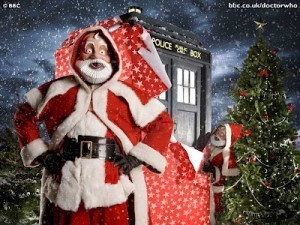 Structurally speaking, I think this works very well as a Christmas special – ie an episode to be watched with the not-necessarily-all-Doctor-Who-fans family (assuming some people have families like that) while everyone's overstuffed with food and/or a bit drunk, though it has to be said that there isn't much Christmas content in it. I don't mind that, though – the Christmas iconography that we do see in the episode is quite heavy handed and/or repeated from the year before. Really, more robot Santas? Were they that popular? Also I am very much over the fake snow joke already (and not to spoil or anything, David, but this is so not the last of it). The 'Christmas star' alien ship is definitely ridiculous, and unnecessary.
Structurally speaking, I think this works very well as a Christmas special – ie an episode to be watched with the not-necessarily-all-Doctor-Who-fans family (assuming some people have families like that) while everyone's overstuffed with food and/or a bit drunk, though it has to be said that there isn't much Christmas content in it. I don't mind that, though – the Christmas iconography that we do see in the episode is quite heavy handed and/or repeated from the year before. Really, more robot Santas? Were they that popular? Also I am very much over the fake snow joke already (and not to spoil or anything, David, but this is so not the last of it). The 'Christmas star' alien ship is definitely ridiculous, and unnecessary.
TEHANI:
I'm not yet jaded on the shoehorning of Christmas into these specials – I think it gives a nice continuity of a little something extra to the show, and as you say Tansy, lets people who aren't necessarily fans enjoy the episode without feeling too lost, because it's not necessarily part of the continuity. Although of course there is a lot in it for the fans as well!
DAVID:
I was more confused than anything to see the robot Santas, thought I was having flashbacks or something, but they at least addressed that with the halfway plausible idea that they had been left lying around. I actually had no issues with the Christmas Star ship looking the way it did, as it was quite weblike in appearance and fit the spider theme.
TANSY:
I did appreciate the fact that Donna's chase to get back to her wedding was made all the harder by it being Christmas – and there's a lesson to anyone planning a Christmas wedding, if you get accidentally teleported during the ceremony, getting a cab back to the church will be very tricky!
Oh, I did love her rant about the lack of pockets in a bridal gown, too, but that has nothing to do with Christmas.
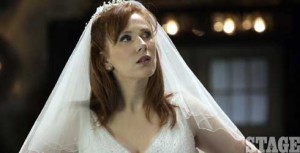 DAVID:
DAVID:
Do people really have Christmas weddings? I found that harder to believe than the ship at the centre of the Earth! I am even more disorganised than usual around Christmas time and, considering I locked myself out of my house the morning of my wedding, I didn't need any more chaos than I actually had.
I do like the concept of a Christmas special, and even though this was only the second occurrence you get the feel that the show is trying to create a tradition. Yes, they can be a little hit and miss but I went into it happy to give a bit of a chance, knowing I was likely to get something a little different than usual.
TANSY:
I love the tradition, don't get me wrong! I wonder sometimes about the Christmassy elements, but the sentimentality of it is quite appealing, especially on the day itself. Although … worth noting for context that it's only the last couple of years that we've actually been able to watch the Christmas Special at Christmas (well, Boxing Day) on TV in Australia – in these early days we were getting it just before the new series, often in the middle of the year. If you didn't have the hang of Other Means which I certainly didn't at this point, then the sense of occasion was a bit lost on us.
The combination of Doctor Who and Christmas is a lovely thing, and it's funny to think that it wasn't always this way. But it doesn't ALWAYS have to snow (or fake sonic screwdriver snow) and I wasn't keen on the robot Santa repetition. Having said all that, Raeli was rewatching the Christmas Invasion the other day, and the killer Christmas tree did make me grin! It's so cheesy it goes out the other side and becomes awesome.
DAVID:
I think that's a very deliberate thing, and big part of the charm of the Christmas episodes (and to a degree, Doctor Who in general) is their ability to not take themselves too seriously. There always has to be a balance, of course, but they got it pretty right. However, I won't be disappointed if there are no Santas or fake snow in the next one!
=======
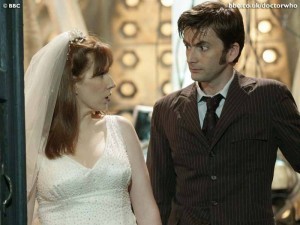 Watching New Who – in conversation with David McDonald, Tansy Rayner Roberts and Tehani Wessely
Watching New Who – in conversation with David McDonald, Tansy Rayner Roberts and Tehani Wessely
David is coming to New Who for the first time, having loved Classic Who as a kid. Tehani is a recent convert, and ploughed through Seasons 1 to 6 (so far) in just a few weeks after becoming addicted thanks to Matt Smith – she's rewatching to keep up with David! Tansy is the expert in the team, with a history in Doctor Who fandom that goes WAY back, and a passion for Doctor Who that inspires us all (plus a seven-year-old daughter who is finding her own Doctors for the first time). We're going to work our way through New Who, using season openers and closers, and Hugo shortlisted episodes, as our blogging points. Just for fun! We have already talked about:
"Rose", S01E01
"Dalek", S01E06
"Father's Day, S01E08
"The Empty Child/The Doctor Dances", S01E09/10
"Bad Wolf/The Parting of the Ways", S01E12/13
Season One Report Card – David, Tansy, Tehani
"The Christmas Invasion," 2005 Christmas special
"New Earth", S02E01
"School Reunion," S02E03
"The Girl in the Fireplace", S02E04
"Rise of the Cybermen/Age of Steel", S02E05/06
Army of Ghosts/Doomsday, S02E12/13
Season Two Report Cards: David, Tehani, Tansy
February 9, 2012
Friday Links Wears Comfy Slippers
For those who haven't got this link already from my Why Amy Pond Should Live post, I wanted to draw attention to Seanan McGuire's "Bodybag Blondes" about the way female characters are treated as disposable in TV & film drama.
Meanwhile, my post about Fabulous Graphic Novels For People Who Hate Superheroes has been gathering steam with readers jumping in to offer their own lists of recommendations. For once, please read the comments!
I've been gathering links about writing opportunities, interesting competitions etc. and thought this was the best place to post them. If anyone hears of competitions open to kids in particular, please let me know, as I've been tasked with finding some for several talented young kids.
In the mean time:
Lian Tanner is offering audiobooks of Museum of Thieves and City of Lies, read by (I'm so jealous!) the fabulous Claudia Black, as prizes in two contests – one for kids and one for adults. Both contests sound creative and fun. Closing date Feb 19th.
Allen and Unwin has announced the Voiceless Writing Prize, in partnership with Australian Ethical Investment: for a short story between 5000 and 10,000 words long "which advances the understanding of animal sentience, human – animal relationships and the ethical treatment of animals, with a focus on food animals and animals found in the Australian landscape."
The prize is one of the richest of its kind in Australia, offering prizes of $15,000 and $5,000, as well as a payment of $500 to every entrant who has their entry included in the Voiceless Anthology arising from the Prize.
Entries for 2012 close Friday 16 March 2012.
Speaking of speaking up, this post about the ethics of taking and then selling ARCs in the book blogging world really caught my attention.
I also really loved this collection of photographs of roller derby women breastfeeding – the juxtaposition makes me happy, and anything we can do to normalise images of breastfeeding (and challenge the preconceptions people might have about mothering) has to be good.
Amy Reeder, one of DC's few female artists, talks Batwoman and her creative process. It's going to be a tough act to follow J.H. Williams' extraordinary style, but it sounds like an excellent collaboration and I'm excited to see where Batwoman goes next.
Fabulous Graphic Novels For People Who Hate Superheroes
Hate superheroes? As Deborah Biancotti says, they probably hate you too. Meanwhile, as requested by Sean the Blogonaut, here are some of my recs for fantastic graphic novels that don't include capes, masks, or anyone saying "Holy Rusting Metal, Batman!" (Yes I did rewatch Batman Forever recently, thank you for asking)
These are the ones that occur to me right now. There are of course many, many other superhero-free graphic novels out there, and the best thing about a list like this is not only that I will remember a bunch more as soon as I hit "publish" but also, I hope, that many of you will think of your own super-obvious examples and will share them in the comments. So then I get to find out about new things to read too, hooray!
<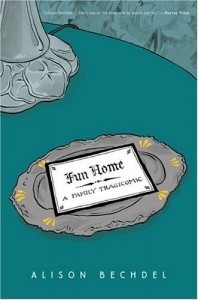 strong>Fun Home, written & drawn by Alison Bechdel
strong>Fun Home, written & drawn by Alison Bechdel
Always top of my recommendation list, this is an extraordinary memoir which demonstrates the power and scope of the graphic novel as an art form. This is the sad, rich story of a young woman who barely gets a chance to come to terms with her own lesbian identity before her family is confronted by the revelation that her father is gay, and has been keeping it from his family for many years. Bechdel chronicles her relationship with her father in minute, almost painful detail, with her childhood home (the house he was determined to renovate to perfection) standing as a powerful symbol at the heart of the story. The only flaw in this exceptional book was the almost-invisibility of Bechdel's mother, but she has since rectified that with a sequel dealing with that equally important relationship in her life, which will be released in a few months.
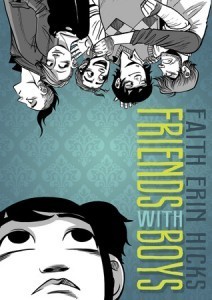 Friends with Boys, written and illustrated by Faith Erin Hicks
Friends with Boys, written and illustrated by Faith Erin Hicks
Just released this month, the whole graphic novel has been released as a serial webcomic, so you can check it out before buying. I love the art style of this one, which is the story of an earnest, shy teenage girl trying to deal with going to public school after a childhood of home schooling, the loss of her runaway mother, the friendship of her beloved older brothers slipping away from her, and the ghost that haunts the local graveyard. I love it to bits, and plan to get hold of it in hard copy for rereading purposes, and to pass on to my daughters. It has great things to say about individuality and friendship and bullying and family… and if nothing else, the high school performance of a zombie musical has to be seen to be believed.
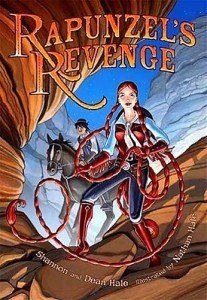 Rapunzel's Revenge & Calamity Jack, written by Shannon & Dean Hale and art by Nathan Hale
Rapunzel's Revenge & Calamity Jack, written by Shannon & Dean Hale and art by Nathan Hale
More YA titles, this series takes the common trope of reimagined fairytales, and smashes them with a gorgeous Wild West with Occasional Steampunk landscape. Vivid art, and two compelling protagonists. Might possibly be bending the rules of this list because Rapunzel is pretty much depicted here as a superhero.
The Forgotten, by Tony Lee and Pia Guerra
My favourite Doctor Who graphic novel, this story captures the personalities of the Tenth Doctor and Martha excellently, but tells a story of Moffat-like (even Gaiman-like, with one particular plot twist) complexity. The best part is the structure, which requires the Doctor to delve back into memories of all his former selves, and specific eras of his adventures. I love the special touch with the stories set in the 60′s, which are drawn in black and white! One for the devoted fans to relish.
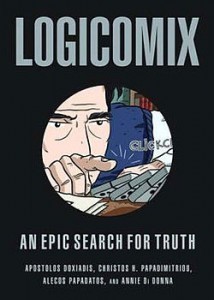 Logicomix, written by Apostolos Doxiadis and Christos Papadimitriou, art by Alecos Papadatos
Logicomix, written by Apostolos Doxiadis and Christos Papadimitriou, art by Alecos Papadatos
I'll admit I haven't read this one, but it's one that my honey will enthusiastically recommend to anyone with an interested in the sciences or, more importantly, the history of mathematics. Narrated by Bertrand Russell, it moves between the late 19th century and the present day, and introduces the reader to many of the great thinkers of history. It's a mighty tome and a bestselling book, which comes with colossal geek cred.
Questionable Content Vols 1 & 2, written & drawn by Jeph Jacques
Another webcomic that I love, this has been going for many years, but the first 500+ strips are published in hard copy across these two books – it's basically an indie music geek soap opera, featuring a guy, his sociopathic pet robot, and the many fierce and spectacular women in his life, many of whom work in the cafe Coffee of Doom. The second volume is particularly strong, covering the material where the writer-artist really came into his own, and found his voice, with some hard-hitting revelations about one of the central characters, plus the usual dollop of banter and bad customer service. It also contains the moment when Jacques had to decide whether his comic really was just a will-they-won't-they romance or… something else. Thankfully, he embraced the unknown and the story has gone from strength to strength. Sadly they seem to only be putting out one print volume of the collected strips per year. I'd buy more.
Sorcerers and Secretaries, written and drawn by Amy Kim Ganter
An American manga told across two volumes, and published by Tokyopop. It tells the story of Nicole, a student and secretary who goes from unrewarding task from unrewarding task, only really happy when writing down the stories in her head. The boy who wants to catch her attention is determined to help her with getting published, once he figures out it's the only thing she cares about. It's utterly fluffy, but has very nice art, and while I wasn't 100% behind the romance, I very much enjoyed the focus on the creative process and the inner thoughts of a fantasy writer.
 Hark, A Vagrant, written & drawn by Kate Beaton
Hark, A Vagrant, written & drawn by Kate Beaton
Yes, another compilation from a webcomic. If you haven't previously experienced the bizarre and wondrous world of historical mash ups, literary satire and general stylish pop culture snark that comes out of Kate Beaton's brain, then rush NOW to the Hark, a Vagrant site to catch up. Or, you know, buy her book! I bought several this Christmas as gifts, including one for me. Definitely the book to get the history/classic literature reader in your life, who thinks comics are silly. They have no idea how silly (and awesome) comics can TRULY be until they have seen this!
February 8, 2012
Galactic Suburbia Episode 53
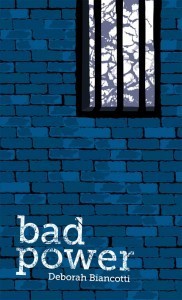 In which we pop the cork on the champagne bottle to welcome in the beginning of the 9 month science fiction awards season – hooray!
In which we pop the cork on the champagne bottle to welcome in the beginning of the 9 month science fiction awards season – hooray!
News
Responses to the Galactic Suburbia Award.
Crawford nominees and winner: Genevieve Valentine's Mechanique.
BSFA nominees
SF Translation Awards Fundraiser – donate and win awesome books
The Kitschies: yes really, rum and tentacles.
LOCUS Recommended Reading List! [and Poll]
Young Australian of the Year who founded Robogals: Marita Cheng
Women of SF in their own words, reviewed by Brit Mandelo
Diana Peterfreund: following up on Brave New Love [and how the internet often fails to pick up the pieces after a controversy has died down]
Women Writing Horror (it's new, who knew?)
[and the other Guardian article patronising genre readers, taken apart by Smart Bitches Trashy Books]
Creature Court trilogy giveaway – we'll be drawing it next episode, email us to tell us about one book you read because of us & you'll enter the draw to win all three books by Tansy
Creature Court Spoilerific Blog Post – only for those who have read Creature Court Book Three, Reign of Beasts, by Tansy Rayner Roberts
What Culture Have we Consumed?
The new episode is up! Go grab it and chug it down like a glass of semi-expensive sparkling white.
Alisa: Juliet, Naked by Nick Hornby; The Last Little Blue Envelope by Maureen Johnson
Alex: Clockwork Rocket, Greg Egan; A Fisherman of the Inland Sea, Ursula le Guin; The Business of Death, Trent Jamieson; Skyrim
Tansy: Bad Power by Deborah Biancotti; Batgirl: the Lesson; Redwood & Wildfire by Andrea Hairston; Blake's 7: The Turing Test [Big Finish], Doctor Who: Foe From the Future [Big Finish]
Please send feedback to us at galacticsuburbia@gmail.com, follow us on Twitter at @galacticsuburbs, check out Galactic Suburbia Podcast on Facebook and don't forget to leave a review on iTunes if you love us!
February 7, 2012
Bad Power, by Deborah Biancotti
 Hate superheroes?
Hate superheroes?
Yeah. They probably hate you, too.
What if there were superpowers in the world, but no superheroes?
Deborah Biancotti has a reputation in Australia for rich, complex prose and bleak stories about the quiet horrors that we all hope will never happen. The Book of Endings, her first collection, made a powerful statement about the kind of fiction she is known for – and Bad Power, her far more slender second collection, makes an entirely different statement about the writer she is going to be.
The stories in Bad Power have a clear, sharp narrative, and a more restrained approach to her prose. As with many of the Twelve Planets collections, the stories are connected and serve to build up a particular world, based on a single premise. In this case, it is the idea that some people have powers, what comics readers or TV/movie fans would immediately designate superpowers, and that there is something deeply sinister about those powers, and those people.
I tore through this book very quickly – it was such a fast-paced read, and so very enjoyable. Once it became clear that the order of the stories was important and that each fed something into the others, the mystery of how to fit all the pieces together added an extra layer of enjoyment. Each story has its own compelling protagonist, and distinct voice. My favourites were Detective Enora Palmer and Detective Max Ponti, just as my favourite stories were "Palming the Lady" and "Crossing the Bridge," but this is one of those collections where the whole is far more than the sum of its parts.
BAD POWER, by Deborah Biancotti
Twelfth Planet Press
reviewed as part of the Australian Women Writers 2012 National Year of Reading Challenge
Tansy's Australian Women Writer's 2012 Reading Challenge.
1. Eona by Alison Goodman (fantasy)
2. Cooking the Books by Kerry Greenwood (contemporary crime)
3. Bad Power by Deborah Biancotti (spec fic, superhero)
February 6, 2012
Agathon #6 – The Secret of Chimneys [1925]
The edition Tansy read
It's been a while, but we're back in business! Kathryn and I have taken the challenge to read every book written by Agatha Christie, in order of publication and we're blogging as we go along. Spoilers are likely.
Agathon #6: The Secret of Chimneys [1925]
Anthony Cade, Superintendent Battle, Eileen "Bundle" Brent
TANSY SAYS:
Here we go again! This is another Agatha Christie novel that doesn't fit my apparently-narrow previous idea about what an Agatha Christie novel was. Instead it's another of these early – what do we call them? Not quite spy novels, more intrigue romps. Definitely not a murder mystery, though there is murder and mystery aplenty.
Having said that, the plot of this one is even more bonkers than I have come to expect from Christie's early work, and the various threads of lost European royalty, con men, posh people with titles and dead bodies frankly bemused and befuddled me. Having said that, my heart was won very early on by the gorgeous and banterrific Virginia Revel – I paid attention pretty much for her, and everything that came out of her mouth.
Christie writes marvellous young women! I tend to find all her younger male characters quite bland, with only the older and more character-laden men being worth paying attention to (with the possible exception of Hastings) and in this book I did enjoy the gruff and intelligent Superintendent Battle. But the absolute stars of The Secret of Chimneys for me were Virginia and, to a slightly lesser degree, Eileen "Bundle" Brent (whom I see from our spreadsheet is going to make a comeback, hooray!)
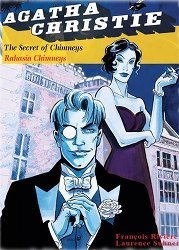 Virginia feels very much like a British version of the kind of characters Katherine Hepburn used to play in the 30's: she's witty, beautiful, flirtatious, and utterly in touch with her own frivolity. She's also very sexually confident, and enjoys half her male acquaintance being in love with her. I liked that she was originally brought into the conspiracy because the aristocratic blokes trying to deal with – all that complicated plot business which I won't pretend I understand or remember – admired her charm and intelligence. Then of course, while they tried desperately to patronise her, she ran rings around them constantly. In another era, she would totally be alongside Patrick McNee in the Avengers. Is it too much to hope there was a movie version of this novel made in the 60's starring Diana Rigg?
Virginia feels very much like a British version of the kind of characters Katherine Hepburn used to play in the 30's: she's witty, beautiful, flirtatious, and utterly in touch with her own frivolity. She's also very sexually confident, and enjoys half her male acquaintance being in love with her. I liked that she was originally brought into the conspiracy because the aristocratic blokes trying to deal with – all that complicated plot business which I won't pretend I understand or remember – admired her charm and intelligence. Then of course, while they tried desperately to patronise her, she ran rings around them constantly. In another era, she would totally be alongside Patrick McNee in the Avengers. Is it too much to hope there was a movie version of this novel made in the 60's starring Diana Rigg?
Bundle on the other hand is a quieter sort of female, more docile and domestic, and yet she is every bit the wit that Virginia is – snarkier and more understated in her remarks. I enjoyed their double act and would have liked to see many more scenes with them together.
[SPOILERS]
The reveal at the end about our con man protagonist (sort of) Anthony Cade being a secret prince and heir to the throne of Whereverslovakia was hilarious and awful in its bizarreness, even if it made a terrible kind of sense. And it was totally worth it for the scene in which he tells Virginia exactly who it is she married.
"How perfectly screaming!"
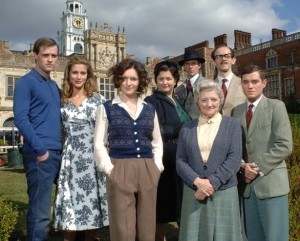
The TV adaption adds Miss Marple. changes the murderer (like that matters) and casts the awesome Dervla Kirwan as Bundle
KATHRYN SAYS:
This installment felt a bit soulless to me. My major trouble is with hero of the story, Anthony Cade. He's FAR too perfect, and even when you think he's down and out, you find out later he's not (cos he's perfect). And Christie keeps mentioning his bronzed face and lean body, which to be honest is a little unsettling! Perhaps what I found missing from this installment is a bit of grit and grime (which seems a little odd to say when there's murder, and leaving-of-bodies-beside-the-road, but there you go), but everything seemed to sort itself put far too neatly.
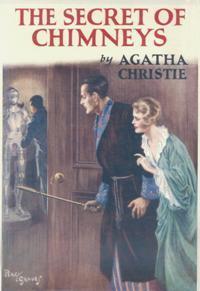 Also, this novel was quite uncomfortable to read from a race point of view – it starts off with a few derogatory remarks about Africans, and then moves on to some less than flattering mentions of Jews, and 'dagos' (which in this case seemed to mostly be referencing citizen of the fictitious European country Herzoslovakia). 'The Secret of Chimneys' was published in 1925. Obviously it's a book of its time, but does that make it ok? Does this represent Christie's own views or is she just writing what she sees?
Also, this novel was quite uncomfortable to read from a race point of view – it starts off with a few derogatory remarks about Africans, and then moves on to some less than flattering mentions of Jews, and 'dagos' (which in this case seemed to mostly be referencing citizen of the fictitious European country Herzoslovakia). 'The Secret of Chimneys' was published in 1925. Obviously it's a book of its time, but does that make it ok? Does this represent Christie's own views or is she just writing what she sees?
The main positives of the book are Christie's female characters. Virginia Revel is the kind of women I'd want to be in 1925 (most specifically independently wealthy and quite able to run her own life). I probably have a bigger a soft spot for Bundle, though, – so earnest and pragmatic and one of those young ladies of a certain age who gets lumped with an unusual nickname. I'd love to know if this was common at the time, or if it's just a 'Christie' thing. I can think of several young ladies of Christie's invention who have suffered an unusual nickname (Lettuce is one that comes to mind), indeed Bundle's younger sisters have already given the monikers of Guggle and Winkle at 10 and 12! Also, I have to admit that the book does have some fairly charming chapter titles: Anthony Disposes of a Body, Mainly Political and Financial, Anthony Signs on for a New Job.
So in summary, some good lady characters (though I'm not sure it passes the Bechdel test), a motley assortment of uninspiring men, and a far too neat resolution. Not awful, but not great either.
TANSY COMES BACK TO SAY:
I know we don't normally do right of reply, but I wanted to agree with your point about the casual racism in the book, something that's very much of its time but also not going to become LESS of an issue with Agatha Christie as we go on.
I'm pretty sure that it does pass the Bechdel Test (we should check in with this for each book!) because of the bit where Virginia calls up Bundle and says she's coming to Chimneys, nothing would keep her away, what ho, old girl.
The chapter where Anthony disposes of the body is pretty great, and the ramifications of this demonstrate that Christie's sense of humour was pointed sharply inwards – she's poking fun at the same genre conventions that her novels rely upon.
COMING NEXT:
The Murder of Roger Ackroyd (1926)
[Hercule Poirot]
The Big Four (1927)
[Hercule Poirot, Arthur Hastings, Chief Inspector Japp]
The Mystery of the Blue Train (1928)
[Hercule Poirot]
The Seven Dials Mystery (1929)
[Eileen "Bundle" Brent, Superintendent Battle]
Oysters, Sand and Worldbuilding as Plot
 There's a trick, well-honed over the last eleven years, to finding a good ROR retreat. Ideally, we need some kind of shared accommodation to fit 5-8 writers, a working kitchen so Mr Flinthart can do his thing, a decent-sized space to all sit in for critiquing sessions, some inspiring scenery and some nice walking areas nearby.
There's a trick, well-honed over the last eleven years, to finding a good ROR retreat. Ideally, we need some kind of shared accommodation to fit 5-8 writers, a working kitchen so Mr Flinthart can do his thing, a decent-sized space to all sit in for critiquing sessions, some inspiring scenery and some nice walking areas nearby.
Steeles Island, a mostly-private peninsula out near Carlton Beach (on the eastern shore of the Derwent River), turned out to have all these things in spades. It was a lucky find, as it turned out to have so many benefits we hadn't even hoped for.
This particular ROR (wRiters on the Road/Rise/Riesling) had a family theme to it. We'd only included family members once before, when little Raeli was too young for me to bear leaving her behind for a whole four days, and so she and my honey came along to a North West Coast Tasmanian ROR, staying nights with us at the Hawley Beach house we rented, and disappearing during the days to visit relatives. This time around, we planned to do something similar only with Jem along – and then Margo and Rowena decided to bring family members too!
 The house was so decadently large that we were able to critique separately from the non-writers in our party, and had the benefit of getting to know each other's families as well as the non-stop industry talk that characterises these retreats.
The house was so decadently large that we were able to critique separately from the non-writers in our party, and had the benefit of getting to know each other's families as well as the non-stop industry talk that characterises these retreats.
We tried the experiment of using an iPad and Skype to include a long-distance member, with our virtual Maxine sitting in on a couple of sessions, as well as getting to have one of her own. It worked a lot better than we suspected it would, and while you wouldn't want to do it every time or for every session (the great value in these retreats is getting to hang out in person) it was certainly better than having no Maxine at all! Those who weren't experienced with Skype found it quite distracting to be talking to a black panel, and we talked at one stage about decorating a boiled egg to represent our Maxine (a random apple core just didn't have the right aura about it) but we coped valiantly with the technical challenge. A good precedent, I think. We had also meant to record podcasts while we were there, but totally forgot. Sorry!
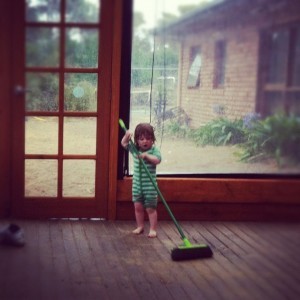 We were right on the beach, so the girls (and grown ups) tracked sand everywhere, indulged in recreational sweeping (or as Jem put it: the Cleaning Game) and generally had a ball. The tennis courts, mini-golf, swings, kayaks, and especially the pool table were all utilised, and we were greatly entertained by the facilities we could never use to their full extent, like the six fridges, three ovens and gazillion beds – the house is usually used to cater family weddings and conventions, and can comfortably sleep 20, or feed 50. The non-writers also took the chance to go off adventuring, as we were close to historical sites like Port Arthur, and tourist attractions like the berry farm.
We were right on the beach, so the girls (and grown ups) tracked sand everywhere, indulged in recreational sweeping (or as Jem put it: the Cleaning Game) and generally had a ball. The tennis courts, mini-golf, swings, kayaks, and especially the pool table were all utilised, and we were greatly entertained by the facilities we could never use to their full extent, like the six fridges, three ovens and gazillion beds – the house is usually used to cater family weddings and conventions, and can comfortably sleep 20, or feed 50. The non-writers also took the chance to go off adventuring, as we were close to historical sites like Port Arthur, and tourist attractions like the berry farm.
And oh, everywhere we looked there was water, sand or greenery. A beautiful place, inspiring and (mostly) secluded. The mud crabs delighted the girls, as did the ocean in their back yard, and I only regret that the changeable Hobart weather only created two perfect swimming days – the one when we arrived and the one when we left, of course! The storm in between was marvellously atmospheric, though, and we only had one day so cold that the mainlanders started to look a bit grim and shivery. And yes, we let them have a wood fire.
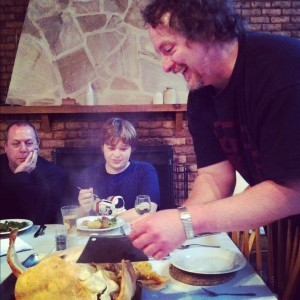 The food as ever was epic, Dirk being delighted with the best kitchen we'd ever provided for one of these events – he offered up salmon, salads, baked chicken in damper crust, smashed potatoes, butter chicken, lemon cake with strawberries, pancakes and a truly luscious bread and butter pudding. Also fresh-baked bread, and for one especially memorable breakfast, petit pain au chocolat hot from the oven. The older kids often hung out with him in the kitchen, and he shared cooking tips and techniques with them. Raeli was especially excited to see bread made from scratch! We also ate our way through titanic quantities of fresh dark cherries and sweet greengages.
The food as ever was epic, Dirk being delighted with the best kitchen we'd ever provided for one of these events – he offered up salmon, salads, baked chicken in damper crust, smashed potatoes, butter chicken, lemon cake with strawberries, pancakes and a truly luscious bread and butter pudding. Also fresh-baked bread, and for one especially memorable breakfast, petit pain au chocolat hot from the oven. The older kids often hung out with him in the kitchen, and he shared cooking tips and techniques with them. Raeli was especially excited to see bread made from scratch! We also ate our way through titanic quantities of fresh dark cherries and sweet greengages.
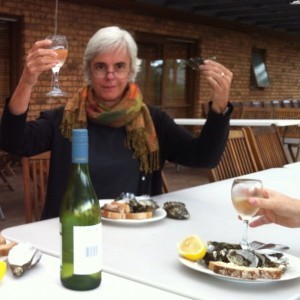 Being so close to Barilla Bay, we had to "do oysters" one night! We did have permission to raid the local oyster beds, but they were frighteningly large and mostly underwater, so we ended up playing it safe and not risking the wrath of the sea gods. We bought seven dozen and ate our way through them on the night of the official release dates of Margo's and my books – particularly appropriate for Sea Hearts! Though no seal wives were harmed in the making of our dinner.
Being so close to Barilla Bay, we had to "do oysters" one night! We did have permission to raid the local oyster beds, but they were frighteningly large and mostly underwater, so we ended up playing it safe and not risking the wrath of the sea gods. We bought seven dozen and ate our way through them on the night of the official release dates of Margo's and my books – particularly appropriate for Sea Hearts! Though no seal wives were harmed in the making of our dinner.
It wasn't all eating and talking – though of course that is a huge part of our ROR weeks! There was work, too, and we critted up a storm, with quite intense working sessions that left us light headed and sleepy by the time evening came around. There is absolutely no price you could put on the benefit we get from having so many dedicated professionals giving feedback on your book-in-progress, and getting a window into their process at the same time. We had books that were fragment first drafts, books which were five minutes away from going to the publisher, and everything in between.
And of course, what is workshopped at ROR stays at ROR. But oh, I wish I could tell you about these fabulous books that are coming!
We talked a lot about worldbuilding as plot, one of my favourite writing techniques, because once it was raised in one session, it became relevant to all the others (of course!). We talked a bit about agents, ebooks and the changing marketplace, too. And, it being our anniversary ROR (we didn't manage to have one for our ten year mark – this makes it eleven) we ended up looking back on our our careers had changed and developed since the original five of the group came together. Rowena has been archiving the goals we set every ROR, and it's fascinating to see which of our past predictions came true, and which were heartlessly abandoned. Marianne and Trent (and Maxine, of course) we missed you MOST on that night!
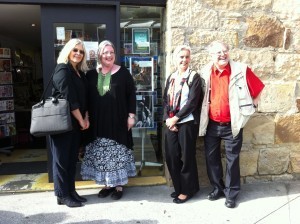 I'm very pleased that I managed to time my book launch to fit with the last day of ROR (it involved some very precise timing and great goodwill on the part of my publisher!) and even more pleased that Margo was able to join me. It's a rare thing to have so many of MY author people at one of my book launches, and it felt like an appropriately dramatic way to celebrate the end of a trilogy that began, as many of my books do, with a ROR manuscript. [more launch pics here]
I'm very pleased that I managed to time my book launch to fit with the last day of ROR (it involved some very precise timing and great goodwill on the part of my publisher!) and even more pleased that Margo was able to join me. It's a rare thing to have so many of MY author people at one of my book launches, and it felt like an appropriately dramatic way to celebrate the end of a trilogy that began, as many of my books do, with a ROR manuscript. [more launch pics here]
It all feels a little flat now it's over – and we keep thinking of other ways to use that magnificent house! It would be a fabulous site for a Clarion style writing workshop, or boutique professional conference. (Tehani and Terri, take note) The sign of a good ROR is that we start musing nostalgically about coming back to that particular place before we've even left… but of course, we never do. There are always new places to explore.
Rowena's ROR report here, with a bunch of different pictures of different bits of the house and island!
Margo's report on the ROR blog, talking about Formidable Energies – the very very early stage novel she brought to our workshop!
February 5, 2012
Why Amy Pond Must Live
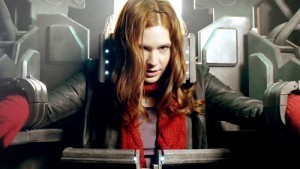 Doctor Who, especially the classic show, has a reputation for being a bit sexist. Which is hardly surprising, considering that it is a product of its time across so many different decades. We lucked out in the late sixties when a classic battle of the sexes episode (including a scene where Jamie spanks Zoe, Taming of the Shrew style) failed to be made. But with such a paternal structure, whereby the Doctor is male and also the character who knows most about everything most of the time, and the employment of such strategic companion costumes as the mini-skirt and, in the 80′s, the mini-skirt AND boob tube combination (not to mention poor Peri in her leotard and shorts) it certainly doesn't escape that taint. Even the female characters allowed to be close to the Doctor's intellectual equal, such as Liz and Romana, are regularly taken down a peg or two because the entire premise of the show is that the Doctor is more capable at what he does (even when being comedically bad at what he does) than anyone else.
Doctor Who, especially the classic show, has a reputation for being a bit sexist. Which is hardly surprising, considering that it is a product of its time across so many different decades. We lucked out in the late sixties when a classic battle of the sexes episode (including a scene where Jamie spanks Zoe, Taming of the Shrew style) failed to be made. But with such a paternal structure, whereby the Doctor is male and also the character who knows most about everything most of the time, and the employment of such strategic companion costumes as the mini-skirt and, in the 80′s, the mini-skirt AND boob tube combination (not to mention poor Peri in her leotard and shorts) it certainly doesn't escape that taint. Even the female characters allowed to be close to the Doctor's intellectual equal, such as Liz and Romana, are regularly taken down a peg or two because the entire premise of the show is that the Doctor is more capable at what he does (even when being comedically bad at what he does) than anyone else.
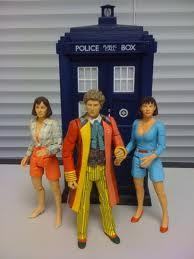 There's a reason that more action figures have been made of Leela in her leathers and Peri in her leotard-with-shorts than any other Doctor Who companions. And let's not get into the recent revelations that Jon Pertwee insisted on a recast of the role of Sarah Jane Smith, because the actress cast before Elisabeth Sladen was too tall, and he liked to perform against a physically small woman, one he could be seen to physically protect. Ahem.
There's a reason that more action figures have been made of Leela in her leathers and Peri in her leotard-with-shorts than any other Doctor Who companions. And let's not get into the recent revelations that Jon Pertwee insisted on a recast of the role of Sarah Jane Smith, because the actress cast before Elisabeth Sladen was too tall, and he liked to perform against a physically small woman, one he could be seen to physically protect. Ahem.
But there's one sexist trope that, narratively, Doctor Who almost never used, and looking back over some of the rather dodgy decisions made by the show and its almost all-male writing tradition, it's quite impressive that they didn't. They almost never killed the girl.
[Spoilers follow for a bunch of Classic & New Who]
To be fair, they almost never killed the Doctor's companion full stop, and a big part of that was the focus on an audience of children and families rather than adult fans (apart from a brief period in the mid-80′s when the show was retooled for a weekday evening audience instead of the usual Saturday teatime). The score is 27 years, 3 dead companions: two young women (Katarina and Sara Kingdom) from the same serial in the mid-1960′s, neither of which had been around for very long, and one young man in the early 80′s (Adric) who enjoys a similar fan reputation to Jason Todd in the Batman comics. If John Nathan Turner had thought of putting up a hotline for (adult, at least) Doctor Who fans to call in and vote whether Adric bought it, chances are the results would have been the same, if less surprising. There's a fourth example, from a year or two after Adric, in which the longstanding companion Peri is killed and taken over in a manner similar to the death of Fred in Angel, then killed again, but the story is undercut later when this is revealed to be a trick, and that she really "lived happily ever after" with Brian Blessed, who had been stalking her for the whole serial. A rare example where the death of a female character felt far less sexist and demeaning than the alternative…
Home at last, two years after they left - Barbara and Ian say "close enough!"
Reading Seanan McGuire's recent post, Bodybag Blondes, about how often female characters are casually killed in TV shows to provoke manpain (a technique also so heavily used in comics that the phrase 'women in refrigerators' and 'fridging' came into common geek vocabulary after Kyle Rayner's girlfriend was literally killed and stuck in a fridge) it occurred to me that one of the awesome things about Doctor Who is that this awful trope is almost never used. So many companions come and go into the Doctor's life, and no he doesn't always get them back home, and yes, there is a problem about how he tends to abandon some of them in situations that MAYBE are less than appropriate, but for the most part, the companion arcs are positive. When they leave, it's often because they're choosing something better, or have found something they are missing, or met someone they want to be with (even if the script itself is less than persuasive on that score, looking at you, Andred and Leela), or just plain found some ruby slippers home. Travelling with the Doctor is a fascinating and educational sabbatical, and there's almost never a sense in Classic Who that the companion plans to stay forever.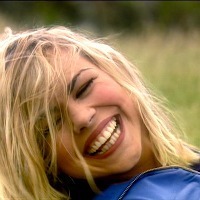 Which is the aspect I never quite felt comfortable with, in New Who. I love this show, but I didn't believe or support the idea that Rose saw nothing but an endless TARDIS journey for the rest of her life, and certainly didn't think the Doctor should support the idea. I winced at the idea that Sarah Jane, once a very independent character, had been pining over Tom Baker's teeth and curls so badly that she couldn't move on with her own life (and a slight rewrite suggesting that the reason she hadn't married was because finding a partner who GOT the alien travel thing was bloody hard might have made all the difference). I was suspicious at Donna happily proclaiming that *she* would be with the Doctor forever, despite not having Rose's youth and naivete and romantic attachment to the Doctor as excuses. And look how that turned out…
Which is the aspect I never quite felt comfortable with, in New Who. I love this show, but I didn't believe or support the idea that Rose saw nothing but an endless TARDIS journey for the rest of her life, and certainly didn't think the Doctor should support the idea. I winced at the idea that Sarah Jane, once a very independent character, had been pining over Tom Baker's teeth and curls so badly that she couldn't move on with her own life (and a slight rewrite suggesting that the reason she hadn't married was because finding a partner who GOT the alien travel thing was bloody hard might have made all the difference). I was suspicious at Donna happily proclaiming that *she* would be with the Doctor forever, despite not having Rose's youth and naivete and romantic attachment to the Doctor as excuses. And look how that turned out…
Only Martha and Jack have really had traditional Doctor Who leaving stories, though with a great deal of emotion wrung out of both – Martha doesn't just leave to help her family recover from an ordeal and, you know, pass her exams, but because she knows the Doctor will never fancy her. Jack is abandoned casually in a horrible future to deal with his new immortality, and spends centuries waiting to yell at the Doctor and receive some closure (something Susan, Steven and many other companions left in less than happy places never got on screen).
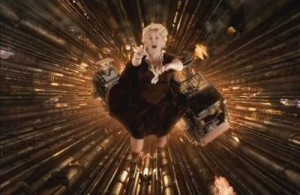 And of course, New Who has killed the girl. There was Astrid Peth, the plucky waitress with her forklift, who killed the bad guy Ellen Ripley style, in a disaster movie style story that led entirely to that moment. There was Adelaide Brooke, the gruff and hard-talking Mars commander, whose suicide at the end of Waters of Mars is utterly baffling, as there's no possible way it can heal the time line and keep history (that the Doctor damaged by saving her) on track. There's a big difference between your aunt dying a hero in space and her unexpectedly teleporting in to shoot herself in your front hall, guys! Not a lot of dead "companions," but 2 in 6 years is a lot more than 3.5 in 27 years.
And of course, New Who has killed the girl. There was Astrid Peth, the plucky waitress with her forklift, who killed the bad guy Ellen Ripley style, in a disaster movie style story that led entirely to that moment. There was Adelaide Brooke, the gruff and hard-talking Mars commander, whose suicide at the end of Waters of Mars is utterly baffling, as there's no possible way it can heal the time line and keep history (that the Doctor damaged by saving her) on track. There's a big difference between your aunt dying a hero in space and her unexpectedly teleporting in to shoot herself in your front hall, guys! Not a lot of dead "companions," but 2 in 6 years is a lot more than 3.5 in 27 years.
There's also a bunch of Moffat-related deaths of almost-companions, such as Madame De Pompadour (rumoured to be making a comeback next season), River Song (whose death is transformed into a virtual reality existence, and who still gets to play in the show after it thanks to time travel) and Rita in season 6, set up to be the best possible Doctor Who companion but died nobly instead. And I wouldn't argue with anyone who thinks the way Donna was written out is tantamount to fridging, even if it allows for hope that someone in the future will fix her loss of memory. She was certainly sacrificed for the sake of manpain.
So basically, when it comes to bodybag blondes, the new show is far more likely to throw a female character under a bus than the old version. That's… interesting. It's not like Classic Who was short on character deaths full stop, there were hundreds and hundreds of on-screen deaths. But even though my personal opinion is that Peri the character was better served by her death as performed than the 'no it didn't happen' scene that removed it, I very much like the fact that Classic Who so rarely killed the companion, and never killed off a female companion who had been with the show for any length of time.
New Who has skirted around it, but they haven't gone there either: the only "companion deaths" were guest stars who were introduced in the same story where they were killed.
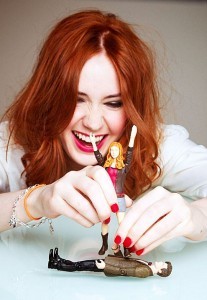 Which is why I am hoping, hoping, hoping, that Amy Pond gets to live. That's what this comes down to. You may have guessed by the title. I'm worried. Steven Moffat has teased, as he often does, that Amy and Rory will finally be written out in the coming season, and that it's going to be "heart-breaking." We know he can't kill off Rory, because the many deaths of that character became a running joke long ago, and it wouldn't make people cry so much as roll their eyes and throw things.
Which is why I am hoping, hoping, hoping, that Amy Pond gets to live. That's what this comes down to. You may have guessed by the title. I'm worried. Steven Moffat has teased, as he often does, that Amy and Rory will finally be written out in the coming season, and that it's going to be "heart-breaking." We know he can't kill off Rory, because the many deaths of that character became a running joke long ago, and it wouldn't make people cry so much as roll their eyes and throw things.
Amy Pond, though. They could kill Amy Pond. It would have huge emotional resonance, at the end of her arc. It would be a great moment for Karen Gillan, who has performed the role with an expanding and impressive range, to show off her chops. (All actors love to go out with a bang, just ask Nicola Bryant what she thinks of Peri's happy ending) It would provoke colossal amounts of manpainy angst in the Doctor.
It would be a huge mistake. And I don't just say that because I have two young daughters who would be devastated. (My seven-year-old's Doctor is David Tennant, because she's into nostalgia – my two-year-old's Doctor is Amy Pond) I don't just say it because my teenage self would have been devastated at the loss of such a character, to the point of not being able to go back and enjoy the many highlights of Amy Pond. And I'm not sure how well my adult self would cope either…
 It would be a mistake because if this show, which has skirted paternalism and sexism and basically got away with a hell of a lot over the decades, if it went THERE with a character who has had an intense two years of character development and audience attachment, and yes, young girls falling in love with Amy Pond, then it becomes a different show. Throwing the female characters under the space bus might make actresses happy, and those grown ups who like their shows 'dark,' but in this case, with a girl we have seen from childhood devote herself to the role of Doctor's loyal travelling companion and fellow adventurer, it would irretrievably break something in the Doctor himself.
It would be a mistake because if this show, which has skirted paternalism and sexism and basically got away with a hell of a lot over the decades, if it went THERE with a character who has had an intense two years of character development and audience attachment, and yes, young girls falling in love with Amy Pond, then it becomes a different show. Throwing the female characters under the space bus might make actresses happy, and those grown ups who like their shows 'dark,' but in this case, with a girl we have seen from childhood devote herself to the role of Doctor's loyal travelling companion and fellow adventurer, it would irretrievably break something in the Doctor himself.
So I'm hoping and trusting. I've loved seasons five and six, and I do THINK I trust Moffat with seven. I can trust him as a writer and a showrunner… as LONG as he doesn't kill Amy Pond. Which goes to show that really, I don't trust him at all. I almost wish we had RTD back (almost) because we know he wouldn't sacrifice the possibility that a wildly popular actress like Karen Gillan might pop back from time to time.
This reminds me of A Good Man Goes To War, where I spent the whole episode so stressed about the baby and what might happen to her that I couldn't enjoy it properly until later, in rewatches, knowing how it would all turn out. Even knowing the outcome wasn't great was less stressful than not knowing it at all.
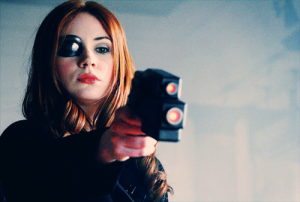 I LIKED the way Amy and Rory were written out in The God Complex. I liked what was done with them in The Wedding of River Song. I liked how they came back into the story in the Christmas special, as dear friends that maybe don't travel with him much any more because they have their own lives. Why can't they just have that? Why does it have to be heart-breaking? And if Amy and Rory are safe, then how is Moffat going to break our hearts? Are our only choices the death of Amy Pond, or the unwriting of River Song's timeline to give Amy and Rory their baby back?
I LIKED the way Amy and Rory were written out in The God Complex. I liked what was done with them in The Wedding of River Song. I liked how they came back into the story in the Christmas special, as dear friends that maybe don't travel with him much any more because they have their own lives. Why can't they just have that? Why does it have to be heart-breaking? And if Amy and Rory are safe, then how is Moffat going to break our hearts? Are our only choices the death of Amy Pond, or the unwriting of River Song's timeline to give Amy and Rory their baby back?
When I see creators gleefully talking about how they're going to make us cry, I do start eyeing the female characters with alarm. Surely making them live and leave the Doctor is more interesting?
Like Seanan McGuire, I've broken up with shows. I've walked away. And the deaths of women have often soured me on shows that I love. The last season of Battlestar Galactica ruined pretty much the whole show for me, because of its treatment of the human female characters. I never really forgave Star Trek: Next Gen for Tasha Yar, or Angel for Cordelia (though to be fair after the colossal awfulnesses they perpetrated on her character towards the end, death was something of a mercy). I don't want to feel that way about Doctor Who. I've forgiven it for QUITE A LOT ALREADY, THANK YOU.
Sara Kingdom: died saving the Doctor in 1966
It is possible to write a death scene for a female character that's so awesome and interesting that it transcends the trope. The trick of course is to make it about HER and not him. The female character dying because she's not up to her job is not clever or interesting. The woman who dies to make way for a more widely approved ship (COUGH DOWNTON ABBEY COUGH) is not original or unique.And yes, they turned all that on its head very cleverly in season five, with Rory dying repeatedly to serve Amy's character arc (and she dying only once, to serve her own) and everyone coming out alive at the end. And yes, season six was all about the Doctor dying, with occasional Rory deaths to lighten the mood. But, again, everyone came out alive at the end. None of those fakeout deaths can counterbalance the effect that an actual, real death of a female companion would have on the show.
The trouble with Doctor Who, of course, is that the central character is the Doctor. Despite some fans complaining that the show that came back in 2005 may as well have been called 'Rose Tyler' and not 'Doctor Who', even with the greater focus on the female companion as point of view character in New Who, the show is ultimately all about the Doctor. Which means that killing off the companions is necessarily going to be more about his story arc than theirs – and if said companions are female then that bodybag blondes (or in this case, redheads) trope is going to rear its ugly head.
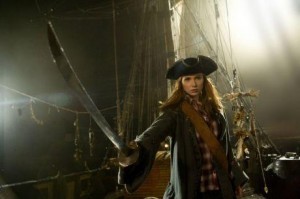 It may be possible that Steven Moffat can write a tragic end for Amy Pond that is so thoroughly about her character, and her arc, and her story, that I forgive him for it, and that I prefer it to the alternative.
It may be possible that Steven Moffat can write a tragic end for Amy Pond that is so thoroughly about her character, and her arc, and her story, that I forgive him for it, and that I prefer it to the alternative.
Is he that good a writer? Maybe he is. But I really don't want to hear any more gloating about how heartbreaking the story is going to be. My heart is already pretty battered and worn down by the treatment of women in all my other beloved pop culture.
Amy Pond is my daughter's Doctor. She's the character that Jem loves most. I don't want our hearts broken when she leaves! And I don't think I am going to relax until I know, which way or another, what end will come. So… it's gonna be a stressful year, then.
Spoilerific Reign of Beasts Post!
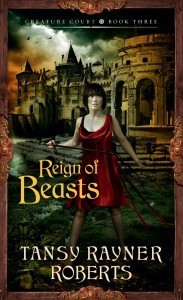 Reign of Beasts is out in Australia and NZ, and the Creature Court trilogy is officially DONE. Here is the post on which to ask me questions, or chat about anything concerning the book. Nothing is too spoilerific! I will try to get back to you as soon as I can.
Reign of Beasts is out in Australia and NZ, and the Creature Court trilogy is officially DONE. Here is the post on which to ask me questions, or chat about anything concerning the book. Nothing is too spoilerific! I will try to get back to you as soon as I can.
SERIOUSLY DO NOT READ IF YOU DO NOT WANT TO BE SPOILED FOR REIGN OF BEASTS & THE CREATURE COURT BOOKS
Locusssed
While we were away RORing (and I am still planning a post on the retreat, honest!) the new issue of Locus came out – and I had forgotten that as it was February, that meant Recommended Reading List! Yee-haw!
Yes, I am a diehard Locus Recommended Reading List fangirl. It's where I got my book recs from before the blogosphere inserted itself into my brain. Which is why it was so exciting for me to appear on there twice – under Collection for Love and Romanpunk, and Short Story for "The Patrician." Heady stuff! The Collection recommendation is especially exciting, as I've never had a whole BOOK recommended by the Locus crew. And it really didn't hurt to be poring over the list with fellow recommendee Margo Lanagan over our breakfast bowls…
I'm really excited and proud about how much positive response I have got from people about "The Patrician" – it's a story that felt right when I was writing it, so it's fantastic to see it mentioned several times in this issue of Locus, by reviewers whose opinions I greatly respect. The book as a whole has gone very well too – Alisa told me this week that she opened the last box of Love and Romanpunk! How exciting is that, for a small press title to be so close to selling out, less than a year after its release?
Jason Nahrung points out all the Aussies on the list. It's lovely to see such a diverse range of Australian authors mentioned – that is, old favourites as well as new names. And lots of women! I was particularly excited to see Thoraiya Dyer and Jo Anderton on their for their work, so early in their careers – potential Campbell nominees, perhaps? But congratulations to everyone to made it, especially those of you who are friends. Cos, you know. I like my talented friends BEST OF ALL.

